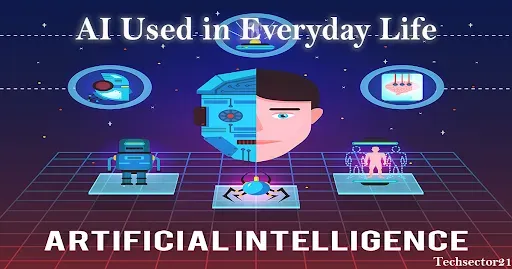Where is AI Used in Everyday Life? Exploring the Impact of Artificial Intelligence
Artificial Intelligence (AI) has increasingly become an integral part of our lives, changing the way we interact with technology and reshaping various industries. From voice assistants to recommendation systems, the impact of AI can be felt across the board. In this comprehensive guide, we delve into the many aspects of AI's presence in everyday life, highlighting its applications and impact.
Where is AI Used in Everyday Life?
Artificial intelligence is ubiquitous, enhancing various aspects of our daily routines and experiences. It is remarkable how AI integrates seamlessly into various industries, bringing efficiency and convenience. Let us explore some of the key areas where AI is making a significant difference:
1. AI-Powered Healthcare
The role of AI in healthcare is important. From diagnosing diseases using medical images to predicting patient outcomes, AI algorithms assist doctors in providing accurate and timely treatments. For example, IBM's Watson Health uses AI to analyze vast amounts of medical data to aid in diagnosis and treatment decisions.
2. Personalized Marketing
In the marketing world, AI helps tailor ads to individual preferences. Recommendation algorithms on platforms such as Netflix and Amazon suggest content and products based on users' past behavior, thereby enhancing the user experience.
3. Virtual Assistants
Virtual assistants like Siri, Google Assistant and Alexa have become an indispensable part of our lives. They use Natural Language Processing (NLP) to interpret and answer user queries, provide information, set reminders, and even control smart devices.
4. Autonomous Vehicles
The automotive industry has adopted AI to develop self-driving cars. These vehicles use sensors, cameras and AI algorithms to navigate roads, detect obstacles and ensure passenger safety.
5. Financial Services
AI is revolutionizing financial services with algorithmic trading, fraud detection and personalized financial advice. Chatbots in banking apps provide quick answers to customer queries, streamlining communication.
6. Education
AI-powered tools provide personalized learning experience. Adaptive learning platforms analyze student performance and adjust curriculum according to their needs, thereby improving engagement and understanding.
7. Entertainment
Streaming services use AI to suggest content based on viewing history, while AI-generated music and art contribute to the creative landscape.
8. E-Commerce
Chatbots assist customers in online stores, answering questions and facilitating purchases. AI also powers inventory management and demand forecasting.
9. Agriculture
AI-enhanced precision farming optimizes crop yields by analyzing data from sensors and drones, helping farmers make informed decisions about irrigation, fertilizer and pest control.
10. Language Translation
Language barriers are broken down by AI-powered translation tools that enable real-time communication between people who speak different languages.
11. Cybersecurity
AI algorithms identify and respond to cyber threats, learning from patterns to detect unusual behavior and prevent attacks.
12. Social Media
Content curation, sentiment analysis and personalized recommendations are powered by AI, enhancing user engagement and experience across social platforms.
13. Energy Management
AI-powered systems monitor and manage energy consumption in buildings, optimizing efficiency and reducing costs.
14. Manufacturing
Automation in manufacturing processes, guided by AI, increases efficiency, reduces errors and enables large-scale customization.
15. Travel and Hospitality
AI simplifies travel by providing real-time updates, helping with booking accommodation and offering personalized itineraries.
16. Customer Service
Chatbots handle routine customer inquiries, providing quick solutions and freeing up human agents to address more complex issues.
17. Real Estate
AI helps real estate agents by predicting property values, analyzing market trends, and providing insights to make better decisions.
18. Environmental Monitoring
AI aids in monitoring environmental conditions, such as air and water quality, aiding in pollution control and resource conservation.
19. Gaming Industry
AI technologies enhance the gaming experience through realistic graphics, intelligent opponents and adaptive gameplay.
20. Sports Analytics
AI algorithms analyze player performance and game statistics, providing coaches and teams with valuable insights to improve strategy.
21. Legal Services
AI streamlines legal research by analyzing vast databases of case law and statutes, helping lawyers build strong arguments.
22. Fashion and Design
AI-powered tools help designers create unique fashion items and predict fashion trends based on consumer preferences.
23. Music Streaming
Music platforms use AI to create personalized playlists and suggest songs based on users' listening habits.
24. News and Journalism
AI helps in expediting information dissemination, automating tasks such as content creation, data analysis and news reporting.
25. Home Automation
Smart homes use AI to control lighting, heating and security systems according to residents' preferences and schedules.
Conclusion
Artificial Intelligence has become an omnipresent force, touching various aspects of our lives. Its seamless integration has led to remarkable improvements in efficiency, convenience, and innovation. As we continue to harness the power of AI, it's essential to navigate the ethical challenges and ensure a harmonious coexistence between humans and machines.

